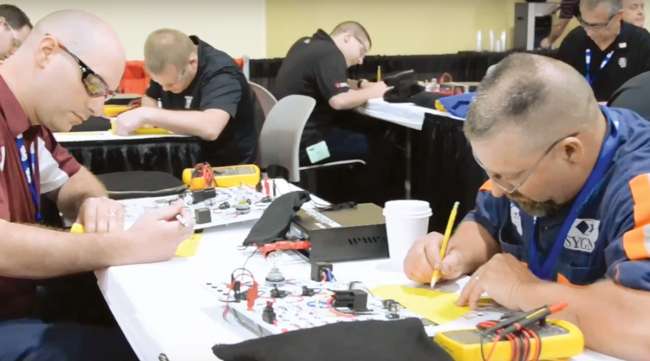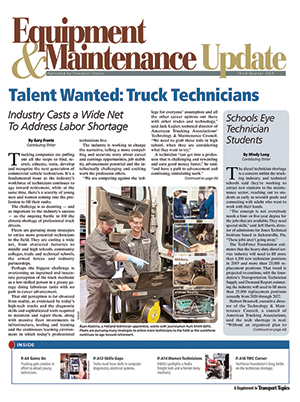Features Editor
The Technician’s Vital Role in Trucking

[Stay on top of transportation news: Get TTNews in your inbox.]
A major concern of the trucking industry is the widely reported shortage of professional truck drivers, who of course play a vital role in the U.S. economy by safely transporting the nation’s freight.
But drivers can’t complete that mission when their trucks are in the shop or broken down on the side of the road, whether it’s caused by a problem with the engine aftertreatment system, some sort of an electrical issue or perhaps a problem with the truck’s brakes.
That’s when it becomes painfully clear that skilled truck maintenance technicians are just as indispensable — and in demand — as truck drivers.

Matso Lysiak
This edition of Equipment & Maintenance Update examines how this industry is addressing the technician shortage and how it is working to attract the next generation of professionals who will keep the nation’s trucks on the road.
The TechForce Foundation estimates that the heavy-duty diesel service industry will need to fill more than 4,300 new technician positions in 2019 alone, as well as more than 25,000 replacement positions.
As readers of E&MU know, but perhaps not the public at large, the job of today’s truck technician is rewarding, challenging and offers strong earnings potential. There also are opportunities for technicians to advance into management roles, such as a fleet’s vice president of maintenance.

- Talent Wanted: Truck Technicians
- Schools Eye Technician Students
- FutureTech Champ Advances Her Career
- Former Army Mechanic Is Now a Truck Tech
- Electric Trucks Will Demand New Expertise
- The Technician's Vital Role in Trucking
- Understanding the Numbers Behind the Shortage
- Trucking Gets Creative in Attracting Young Technicians
- Clear Career Paths Needed for Technicians
- Closing the Skills Gap: Techs Must Master Diagnostics, Electrical
However, one of the top challenges the industry faces in recruiting students and others to the truck technician field is the inaccurate perception and image of it being a greasy and dirty or low-skilled job with little room for advancement.
With all of the exciting and sophisticated technologies that can be found on today’s Class 8 trucks, such as collision mitigation and avoidance systems, those perceptions are certainly not reality. Today’s technicians don’t simply turn wrenches; they connect their laptop computers to trucks to perform critical diagnostics.
Another challenge that has had an impact on the technician shortage over the years is the idea pushed by many to students that a traditional, four-year college degree, or a more advanced degree, is a requirement to secure a well-paying, stable and rewarding career.
The traditional four-year college is not for everyone, and in many cases, can lead to significant college debt that may not be paid off for years after the student lands a job in the real world.
On a related note, I recently had the opportunity to interview Bonnie Greenwood, a shop technician for FedEx Freight. Greenwood, who earned a Bachelor of Science degree, sums up her career choice as a truck technician this way: The trades “are never going away. We’re always going to have trucks transporting goods,” she says. Learn more about how she got to where she is today on P. A14.
Meanwhile, not to be forgotten are ways to show appreciation for the industry’s best and brightest heavy-truck technicians. One way is through the Technology & Maintenance Council’s annual SuperTech competition that recognizes and promotes career opportunities for these skilled professionals. TMC, a council of American Trucking Associations, also holds the National Student Technician Competition — TMC FutureTech — which is geared to student technicians. (Greenwood, in fact, was the first female champion of FutureTech in 2017.)
When reading this edition of E&MU, I hope you gain valuable insights on innovative and creative ways to attract and retain much-needed truck technicians to this exciting industry that never stops moving forward.




